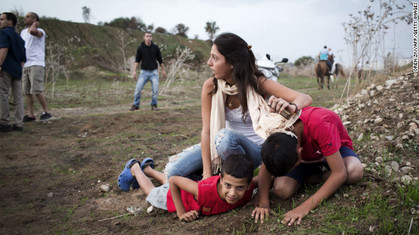 An Israeli woman and her children take cover as sirens wail in Tel Aviv. (CNN)
An Israeli woman and her children take cover as sirens wail in Tel Aviv. (CNN) I won't rehearse here all the charges and counter-charges about rockets, human shields, tunnels, arial assaults near schools and hospitals, and the deaths of so many children. Chances are, you've already made up your mind about all of that. I will say, though, that I am hard-pressed to imagine how else Israel could respond to the rain of rockets falling on its cities. I don't know how any country could respond successfully to an enemy that intentionally endangers civilians so that it can use their deaths as a propaganda and recruitment tool. What on earth would you do?
And just as the conflict in Israel and Gaza appears to be winding down, we today have Tisha B'Av, the most mournful day of the Jewish year. Tisha B'Av commemorates the cosmic devastation experienced by the Jewish people in ancient times when the First Temple was destroyed in 586 BCE and when the Second Temple was destroyed in 70 CE. To Jews, the day marks a rupture in the bonds that connect heaven to earth. It is our "Black Fast." You would think the coincidence of such a dark day at a time like this would feel like a further burden. In fact, it comes as a relief.
Last night we marked Tisha B'Av at the congregation I serve with a service that included the chanting and reading of the book of Lamentations. This 2,600 year-old book of poetry speaks of the anguish of war, death, inhumanity, grief and despair. As I listened to the words, I thought about the suffering of the people of Gaza.
Knees weak, eyes full of tears, and even my bowels bothered, I am sick with grief for the city's wreck and my people's ruin as I see our sorry children and even suckling babes collapse in the desolate streets.
– Lamentations 2:11
We talked about how difficult it is to know where we should put the blame. On God? On "Evil"? On the human race? On the failure within each of our own individual hearts to live up to our highest aspirations? Ultimately, there can be no answers.
No answers – but there is still hope. Our group could not end the evening until we also talked about the belief that each of us has the ability to make the world better. We remembered the teaching that the destruction of the Second Temple came about because of "baseless hatred" among Jews and we pledged to each do our part to replace resentment, anger and disdain with compassion, love and acceptance. Every little bit helps.
Tisha B'Av, for me, comes this year at just the right moment. It comes at a time when I have to cry out in sorrow. It comes during a period in which I have been sick with grief and only partially recognized it. Tisha B'Av this year opens my heart to wailing for a world that is not what it should be, but a world that can yet be redeemed.
Other Posts on This Topic:
Catastrophe
Not Turning Away from Grief

 RSS Feed
RSS Feed
